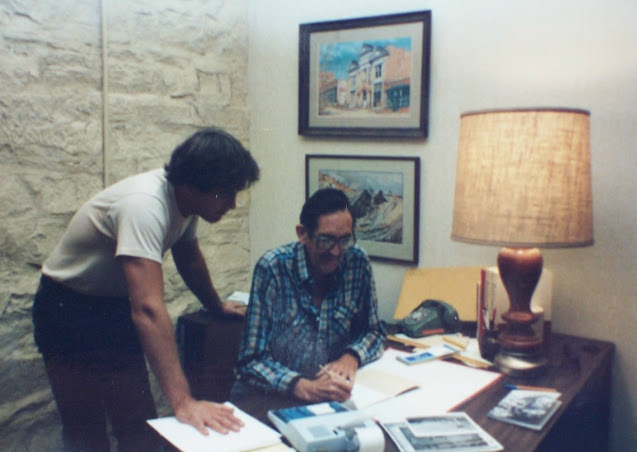 |
| Denver Tribune-Republican May 13, 1885 "Soapy" Smith Jailed (Jeff Smith collection) |
(Click image to enlarge)
oapy Smith jailed.
On May 12, 1885 Soapy Smith swindled a Denver resident named Frank or J. Brockman. The victim was successful in having Soapy Jeff arrested for refusing to return the money lost. The Rocky Mountain News reported the incident.
SAYS HE WAS SOAPED BY SMITH.
An itinerant soap vendor, who sells prize packages of soap and who goes by the name of “Soapy” Smith, was arrested yesterday on complaint of a citizen who charges him with swindling. It appears that the citizen [J. Brockman] bought $30 worth of soap, under the impression, whether given him by Smith or not does not clearly appear, that he would realize $100 in prizes from the soap packages. All the money he did find in the packages appears to have been $1. He therefore says he was soaped by Smith and demands satisfaction.
For the first time (on record), Jeff broke his rule against involving residents. Whether he did so deliberately or accidentally is not known. Also for the first time Jeff was identified in a News story as “Soapy” Smith. The Denver Tribune-Republican (see photos) also covered the arrest.
 |
| Denver Tribune-Republican May 13, 1885 "Soapy" Smith Jailed (Jeff Smith collection) |
(Click image to enlarge)
"SOAPY" SMITH JAILED.
He Is Charged With Swindling Frank
Brockman Out of $30.
"Soapy" Smith was arrested yesterday afternoon by Officer Barr, for a violation of the Lottery ordinance, on the complaint of J. Brockman, who charges that Smith swindled him out of $30.
Smith is a well-known character. His occupation is that of a soap peddler, and he usually takes up his stand at the corner of Holladay [Market] and Seventeenth streets, where he attracts a large crowd of people by selling small packages of soap for $1 each, some of the packages containing bills ranging in value from $1 to $50, but the majority of the packages contain nothing but the small piece of soap
Brockman, it is stated, spent $30 for soap in trying to capture one of the large prizes, but as he only got $1 in return he had the peddler arrested for swindling him. Smith does business under a license issued to him by the city.
Thirty-dollars may not seem like much today, but using an inflation calculator $30 in 1885 is the equivalent of $986.66. The arresting officer, Henry W. Barr, could not prove Jeff had actually swindled Brockman, so he arrested Jeff for being in violation of the city lottery ordinance and had him held in jail pending receipt of $500 bond. The following day John P. Kinneavy, saloon entrepreneur and Jeff’s friend, posted bail. Records show that time and again Kinneavy would come to Jeff’s aid. At the trial on the lottery charge, attorney Judge Miller represented Jeff and was able to get him off with a fine.
Smith claims that he does not pretend that everyone can be lucky and was very indignant when Judge Barnum fined him $25.00. He gave notice that he would appeal the case.You may wonder how I obtained an original newspaper? Soapy himself saved this wonderful piece of old west history, and even bracketed the story with pencil in his own hand. The paper was then placed in his personal "scrapbook" and handed down from generation to generation.
J. Brockman (victim): page 95-96.
"Jeff was a self-taught reader of human nature, and he used his knowledge and criminal skill to exploit the greed and dishonesty of his victims. He knew as soon as he set eyes on a man whether or not he could be 'played.'"
— Jeff Smith, Alias Soapy Smith, Introduction.
FEBRUARY 28
1827: The Baltimore and Ohio Railroad becomes the first railroad incorporated for commercial transportation of people and freight.
1844: Several people are killed aboard the USS Princeton when a 12-inch gun explodes.
1847: Colonel Alexander Doniphan and his Missouri Mounted Volunteers ride to victory at the Battle of Sacramento, California during the Mexican-American War.
1849: The steamship California arrives in San Francisco, California carrying the first gold stampeders. The ship left New York Harbor on October 6, 1848 via Cape Horn, making the trip in four months, 21-days.
1854: Slavery opponents create a new political party, calling it the Republican Party, in Ripon, Wisconsin.
1858: The first U.S. troops arrive at Fort Abercrombie in Dakota Territory, present day North Dakota.
1861: The territories of Colorado and Nevada are organized.
1869: Famed gunman, James Butler Hickok quits his job as an Army scout in Fort Lyon, Colorado Territory.
1883: The first vaudeville theater opens.
1885: American Telephone and Telegraph (A.T. and T.) is incorporated. The company provides long distance service for American Bell.
1893: Edward G. Acheson obtains a patent for Carborundum.
1899: Jesse Edwards James, son of the deceased late outlaw Jesse James, is tried and acquitted of charges that he led a gang that robbed a train near Leeds, Missouri on September 23, 1898.
1900: Bob Lee, a cousin of the outlaw Harvey Logan, is arrested in Cripple Creek, Colorado on suspicion of robbing the Union Pacific train at Wilcox, Wyoming the previous year. Lee is convicted.
1911: Thomas A. Edison, Incorporated is organized.


































